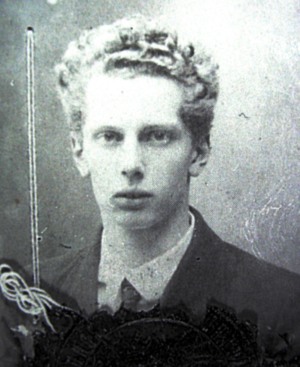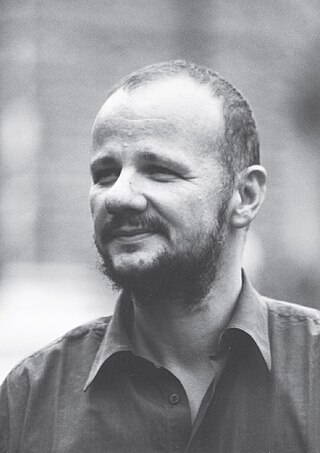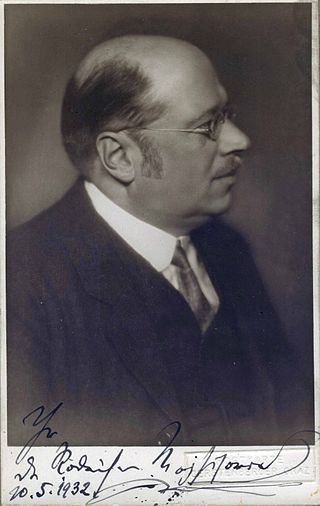Related Research Articles

Wolfgang Rihm was a German composer of contemporary classical music and an academic teacher based in Karlsruhe. He was an influential post-war European composer, as "one of the most original and independent musical voices" there, composing over 500 works including several operas.

Boris Blacher was a German composer and librettist.

Pavel Bořkovec was a Czech composer and music teacher.

Hans Gál OBE was an Austrian composer, pedagogue, musicologist, and author, who emigrated to the United Kingdom in 1938.
Johannes Wolfgang Zender was a German conductor and composer. He was the chief conductor of several opera houses, and his compositions, many of them vocal music, have been performed at international festivals.
Karl Julius Marx was a German composer and music teacher.

Georg Friedrich Haas is an Austrian composer. In a 2017 Classic Voice poll of the greatest works of art music since 2000, pieces by Haas received the most votes (49), and his composition in vain (2000) topped the list.

Karl Ignaz Weigl was a Jewish Austrian composer and pianist, who later became a naturalized American citizen in 1943.

Toshio Hosokawa is a Japanese composer of contemporary classical music. He studied in Germany but returned to Japan, finding a personal style inspired by classical Japanese music and culture. He has composed operas, the oratorio Voiceless Voice in Hiroshima, and instrumental music.
Alexander Mikhailovich Raskatov is a Russian composer.
Paul Angerer was an Austrian violist, conductor, composer and radio presenter.
Gerd Domhardt was a German composer.

Hermann Zilcher was a German composer, pianist, conductor, and music teacher. His compositional oeuvre includes orchestral and choral works, two operas, chamber music and songs, études, piano works, and numerous works for accordion.

Gerhard Schedl was an Austrian composer. His works included chamber works, operas, theater pieces, symphonies, concertos, and sonatas.
Hermann Reutter was a German composer and pianist who worked as an academic teacher, university administrator, recitalist, and accompanist. He composed several operas, orchestral works, and chamber music, and especially many lieder, setting poems by authors writing in German, Russian, Spanish, Icelandic, English, and ancient Egyptian and Greek, among others.

Roderich Mojsisovics von Mojsvár was an Austrian composer based in Graz, head of the Schule des Musikvereins für Steiermark there.
References
- ↑ Mattenberger, Urs (10 August 2019). "Komponist Wolfgang Rihm: "Fühle mich wie ein Kriegsveteran"". St. Galler Tagblatt (in German). St. Gallen. Archived from the original on 14 September 2023. Retrieved 25 October 2019.
- 1 2 "Wolfgang Rihm: the composer's life and work". Universal Edition. 13 March 1952. Archived from the original on 28 July 2024. Retrieved 27 July 2024.
- ↑ Kaltenecker, Martin (30 July 2024). "Wolfgang Rihm, Brahms". Ressources IRCAM (in Latin). Retrieved 12 August 2024.
- 1 2 Clements, Andrew (3 March 2022). "Rihm: Sphäre nach Studie, Stabat Mater, etc review – a modern great, still springing surprises". The Guardian . Retrieved 1 August 2024.
- ↑ "Ins Offene... for orchestra". Universal Edition. Retrieved 1 August 2024.
- ↑ "Wolfgang Rihm: Sphären". NEOS Music (in German). 22 May 2023. Retrieved 1 August 2024.
- ↑ Knockaert, Yves. 2010. Wolfgang Rihm, a Chiffre: The 1980s and Beyond, fwd. Richard McGregor. Leuven: Leuven University Press. ISBN 978-94-6166-237-8 (ebk). ISBN 978-94-6270-123-6 (pbk).
- ↑ Wierzbicki, James (18 August 1991). "Non-Verbal Opera?". St. Louis Post-Dispatch . St. Louis, Missouri. p. 32. Archived from the original on 28 July 2024. Retrieved 18 May 2020– via Newspapers.com.
- ↑ Perry, Richard (26 May 2002). "The 'Jackson Pollock' of German avantgarde". The Ottawa Citizen . Ottawa. p. 26. Retrieved 18 May 2020– via Newspapers.com.
- ↑ Webster, Daniel (23 April 1997). "In Brahms celebration, orchestra's first Rihm". The Philadelphia Inquirer . Philadelphia. pp. 37, 39. Archived from the original on 28 July 2024. Retrieved 18 May 2020– via Newspapers.com. continued on page 39. Archived 28 July 2024 at the Wayback Machine
- ↑ Schacher, Thomas (22 January 2020). "Wo so viel Licht ist, sollte auch ein bisschen Schatten sein". Neue Zürcher Zeitung (in German). Zürich. Archived from the original on 23 January 2020. Retrieved 14 February 2020.
- ↑ Baker, Robert A. (2016). "The Hunt for Form in Wolfgang Rihm's Ninth String Quartet, 'Quartettsatz'". Perspectives of New Music . 54 (1): 197–244. doi:10.7757/persnewmusi.54.1.0197.